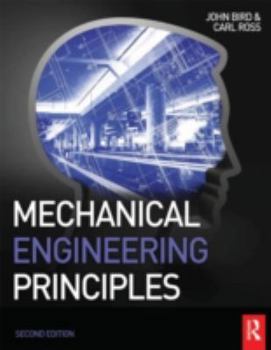Mechanical Engineering Principles
A student-friendly introduction to core engineering topics This book introduces mechanical principles and technology through examples and applications, enabling students to develop a sound... This description may be from another edition of this product.
Format:Paperback
Language:English
ISBN:0415517850
ISBN13:9780415517850
Release Date:May 2012
Publisher:Routledge
Length:312 Pages
Weight:1.95 lbs.
Dimensions:0.6" x 8.5" x 10.8"
Customer Reviews
1 rating
Great Book for Engineering Students to Build their Educational Foundation
Published by Renaissance Man Andrew , 3 years ago
I've said it before I will say it again, if you been reading my blog for some time now, you know John Bird is one of three engineering authors that I hold in high esteem. If you don't know who John Bird is, he's an engineering and mathematics author who writes in a way where readers and students will understand and be able these lessons to the real world. Bird avoids long winded sentences. When he introduces jargon or a concept it is explained easily.
A Much Improved Layout In Content and Readability
If you have not read Bird's 1st edition of Mechanical Engineering Principles, the first great improvement since the 1st edition is the layout. In the first edition, the text, on the surface, looks more like an engineering reference manual rather than an educational book. In the first edition everything is black and white and it's quite easy for one to lose their spot especially when they look up the answers to chapter questions. However, in the second edition chapters, chapter sections, questions and exercises are demarcated with colored headers, different font sizes to indicated the text, chapter sub section, and chapter titles. Also at the start of each chapter, the reader is given a brief yet direct explanation of the material to come and what the student will have learned by the chapter's end.
The Expression of Content is Head and Shoulder Above Other Authors
Anyone who has been following my blog for some time knows how much I despise engineering authors who write in a lofty grandiose way that winds on ad infinitum. Or another aspect of these authors is their lack of clarity in expressing the topic at hand. Bird doesn't write in this style, in fact after reading a number of his books, it's safe to say he eschews such methods of expression. Here are a few examples of Bird's writing style Mechanical Engineering Principles 2nd Edition.
The first example is from subsection 2.5 chapter 2, The Effects of Forces on Materials.
Forces acting on a material cause a change in dimensions and the material is said to be in a state of stress. Stress is the ratio of the applied force F to cross-sectional area A of the material. The symbol used for tensile and compressive stress is σ (Greek letter sigma). The unit of stress is the Pascal, Pa, where 1 Pa = 1 N/m2.
Or from subsection 16.1 which deals with friction.
When an object, such as a block of wood, is placed on a floor and sufficient force is applied to the block, the force being parallel to the floor, the block slides across the floor. When the force is removed, motion of the block stops; thus there is a force which resists sliding. This force is called dynamic or sliding friction.
In the first example, the reader is given the definition of stress, the mathematical definition of stress, the unit of stress, and the symbol, in this case, the Greek letter sigma to indicate stress. In the second example, we are given the definition of what friction is with a corresponding example of friction used in every day life.
Subject Matter Covered Gives Students a Strong Foundation
The topics covered in his book range from the science of materials, second moment of area, dynamics, couples, bending moments, friction, equations of state, simple harmonic motion, and basic fluid mechanics. This list isn't exhaustive, but is meant to provide an overview of the topics presented. For the student, this book will give one the foundation needed to read and understand other engineering books, even books that are poorly written – a student will be able to decipher and determine others mistakes. In the end, I would love to see what John Bird could write about topics as thermodynamics and turbomachinary, with his writing style, I'm certain he will make such subjects accessible for engineering students.




